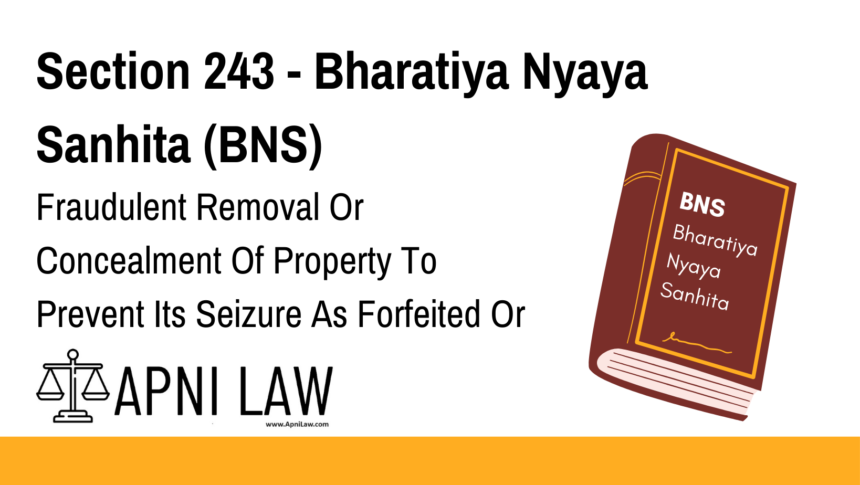Code: Section 243 BNS
Whoever fraudulently removes, conceals, transfers or delivers to any person
any property or any interest therein, intending thereby to prevent that property or interest
therein from being taken as a forfeiture or in satisfaction of a fine, under a sentence which
has been pronounced, or which he knows to be likely to be pronounced, by a Court or
other competent authority, or from being taken in execution of a decree or order which has
been made, or which he knows to be likely to be made by a Court in a civil suit, shall be
punished with imprisonment of either description for a term which may extend to three
years, or with fine which may extend to five thousand rupees, or with both.
Explanation of Section 243 BNS
Section 243 of the Bharatiya Nyaya Sanhita (BNS), 2023, penalizes individuals who fraudulently dispose of or hide property to evade forfeiture, court orders, or debt recovery. This law is crucial in ensuring that court-imposed penalties and civil decrees are effectively enforced.
Key Elements of Section 243 BNS
- Fraudulent Intent – The person deliberately conceals, removes, or transfers property.
- Avoidance of Legal Action – The act is done to evade court-imposed fines or property seizure.
- Judicial Proceedings – The person knows that a sentence, order, or decree has been or is likely to be passed.
- Punishment –
- Up to three years imprisonment, or
- Fine up to ₹5,000, or
- Both.
Illustration
Example 1: Hiding Assets to Avoid Fine Payment
A businessman, after being convicted and fined by the court, transfers his bank balance to a relative to avoid paying the fine. This act constitutes an offense under Section 243 BNS.
Example 2: Concealing Property to Escape Debt Recovery
A person, knowing that the court is likely to pass a decree against him in a civil suit, sells off his land to a friend at an undervalued price to prevent it from being seized. This fraudulent act is punishable under Section 243 BNS.
Common Questions and Answers on Section 243 BNS
1. What is the main objective of Section 243 BNS?
- The section ensures that court-imposed fines, penalties, or decrees are enforced properly and that individuals do not evade their financial or legal responsibilities by hiding assets.
2. What kinds of property transfers are covered under this section?
- Any fraudulent removal, concealment, transfer, or delivery of:
- Cash or bank deposits,
- Land or real estate,
- Movable assets like cars, jewelry, or machinery,
- Business shares or ownership stakes.
3. Can this section apply in both criminal and civil cases?
- Yes. It applies in:
- Criminal cases – When a person tries to avoid fines or forfeiture.
- Civil cases – When a person tries to evade execution of a court decree.
4. What is the punishment for violating Section 243 BNS?
- The guilty person may face:
- Up to three years imprisonment,
- Fine up to ₹5,000, or
- Both imprisonment and fine.
5. Is it illegal to transfer property to family members to avoid court action?
- Yes. If the transfer is done with fraudulent intent to prevent seizure or fine enforcement, it is punishable under Section 243 BNS.
Conclusion
Section 243 BNS is a crucial legal provision that prevents individuals from evading financial penalties or legal obligations through fraudulent asset transfers. It ensures that justice is upheld and debts or fines are properly recovered.
For expert legal advice, visit ApniLaw today! 🚀








